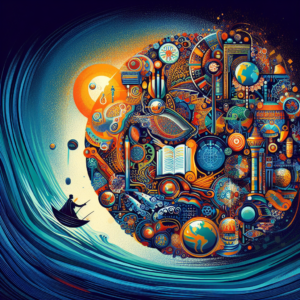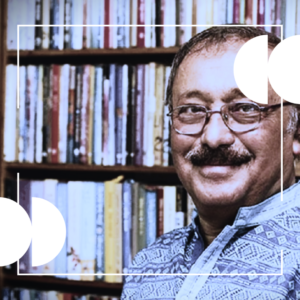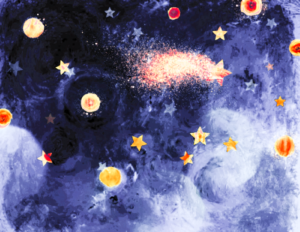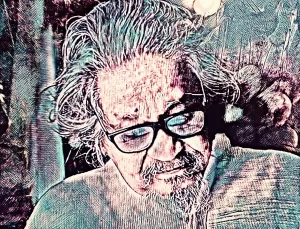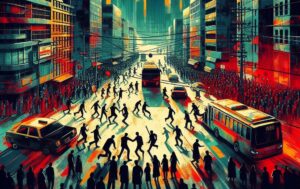
As Covid-19 is ravaging the world and hundreds and thousands of people around the world are dying every day, both optimism and pessimism have become the order of the day. Political scientists, economists, and common people are concerned about the future of the world and the world order. Notwithstanding their differences, one conspicuous agreement among the optimists and pessimists is that the world will not be the same again. Of course, Covid-19 has already changed the world, and its consequences will be felt in our social lives, economy, and global political landscape. To imagine how the world will look like after we survive the catastrophe, we need to understand the lessons of the pandemic.
Among the five lessons the first is that it laid bare the inadequacy of the state-centric security paradigm. State-centric security is the dominant paradigm in international relations and security studies, which shapes the policy options of all countries, particularly the Western nations. It determines priorities and budgetary allocations. It is proven to be inadequate in saving people’s lives. Understandably, this is not new. The notion of human security—emerging in the early 1980s and underscoring the primacy of individuals in addition to state security—has been a part of academic exercises and public rhetoric, but never demonstrated its need on a global scale, until now. The lesson today is that devoid of human security—states will only be at the mercy of nature while millions will die, and the state’s economy and politics will be upended.
Secondly, globalization requires a reset. In the past decade, there have been two perspectives against globalization—one is of unilateralism, insularity, and pernicious nationalism. None other than US President Donald Trump and his administration best exemplifies it. The other is—as globalization’s benefits have been monopolized by a few, it should be completely discarded. As Covid-19 crossed the borders in days, it revealed we are more interdependent than we acknowledge, and it cannot be contained by one country or the other. A global pandemic requires a global response. Xenophobia is not the response that will protect anyone. Covid-19 should not be considered as the vindication of anti-globalization nor a validation that globalization in its current form is adequate. Instead, it has underscored the need for a new form of global framework which does not put profit and cheap labor in the driver’s seat, but human security, public health, public interests and human rights remain at the heart of this effort.
Thirdly, our obsession with the narrow definition of development is detrimental to people and nature. The global race to increase GDP, exploit natural resources and consume everything we find have become defining features of development. Scientists have told us in no uncertain terms that the virus originated in nature. Is this nature’s revenge for our utter disregard for it? To suggest the virus is nature’s revenge is not meant to be a fatalistic statement, but to remind us that it is a making of ours. Humans are part of a natural habitat, to be shared with others; but we seem to have forgotten this a long time ago. We have ignored science, which forewarned us.
The fourth lesson is that the economic policies pursued by countries in the developed and developing world for decades have not only increased disparity between rich and poor, within society and between countries, but created a permanent underclass in various societies. The toxic effects of the neoliberal economic policies were very much obvious to many, yet the states turned a blind eye and continued to serve a small section of society. The vulnerability of the members of the permanent underclass has been exacerbated. They have been living on the knife edge of financial and physical ruin. They are now pushed to the brink, in some cases within weeks after the wheel of the economy grinds to a halt. With little support from the states, they are now forced to choose between life and livelihood, whether they expose themselves to Covid-19 defying the lockdown orders or die of hunger. Some nation states have come up with a comparatively better stopgap measures than others, but the band-aid can only serve as a temporary measure.
Fifth, the wild spread of the virus told us the importance of transparency in governance matters. Had the Chinese government been transparent and let the world know what was happening in the early weeks of December, the situation would have been different. The first series of cases of a new virus were noticed on December 10. Yet, doctors such as Ai Fen, a director at Wuhan Central Hospital, and Li Wenliang, a doctor from Wuhan, were reprimanded and questioned by security officials. Even after Chinese authorities reported the virus to the WHO, eight doctors faced questioning by the Wuhan Public Security Bureau, and an official at the Hubei Provincial Health Commission ordered labs, which had already determined that the novel virus was similar to SARS, to stop testing samples and to destroy existing samples
It is no longer a matter of speculation as to what would have been the benefit had the world known two or three weeks earlier. A study by Dr. Shengjie Lai of the University of Southampton in the United Kingdom examining non-pharmaceutical interventions (NPIs) in response to Covid-19 in China shows, “if interventions in the country could have been conducted one week, two weeks, or three weeks earlier, cases could have been reduced by 66 percent, 86 percent and 95 percent respectively—significantly limiting the geographical spread of the disease.” It is neither an exaggeration nor a political statement that the absence of transparency in China has allowed the virus to spread. We knew the transparency of government is important for the citizens of respective countries, but coronavirus demonstrates that in this era, the adverse impacts are faced by those who live beyond the borders too.
These lessons are only the obvious ones; we can ignore them at our own peril. We are now standing at the crossroads of history. The path we will chose depends whether we have learned the lessons.
